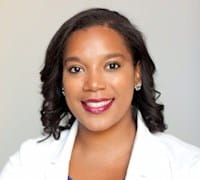What was it like coming to Booth from a non-profit background?
Booth was one of the most humbling experiences I’ve had in my life.
I started at square one with finance basics and was initially intimidated by my classmates. I was shy about asking questions and I’m not a shy person. I just thought everybody had a finance background and were investment bankers and knew more than me. It was not until a classmate asked a question that I was too afraid to ask in a class and I thought, “Whoa, other people have the same questions I do, it’s not just me.” Once that happened, my whole experience at Booth turned around. I realized that everyone is here to learn no matter their background. I then gave myself the challenge of asking and answering at least one question in every class. I think this is especially important since I was normally the only black woman in my classes (especially finance classes). I realized this is my education too and I needed to own it.
What was your favorite class?
Too many to list! A few include Negotiations, Power and Influence, Accounting for Entrepreneurship, Tax and Business Strategy with Ira Weiss.
Do you have a favorite highlight of your time here?
LAUNCH was an extremely reflective experience and gave me the opportunity to understand how I operated as a leader. Every single activity was powerful and provided insight into a new angle of my leadership. I used those learnings as a foundation for what I wanted to work on at Booth. What is great about the Evening Program is that I could then take those learnings and practice them at my job.
My other favorite highlight includes working on a case competition for Arne Duncan’s non-profit Creating Real Economic Destiny (CRED). I worked with a group of civic-minded women from my LAUNCH group to think through these problems around reducing gun violence. It felt like the exact intersection I wanted at business school: social impact and business.
What advice would you offer to incoming Part-Time students?
Balance is all about your priorities. I discovered that priorities change day by day — you may have a meeting for a team project, a work deadline, and a networking event to go to. Which one you decide to give time to may depend on what’s happening broadly in your life. That is one of the biggest lessons I learned in the Evening Program: how to define balance for myself and how to give myself the grace to make decisions based on my values and what I think is important at the moment.
Read our other graduate profiles
Sean Ellis, Chetan Mahajan, Yingting Wang

